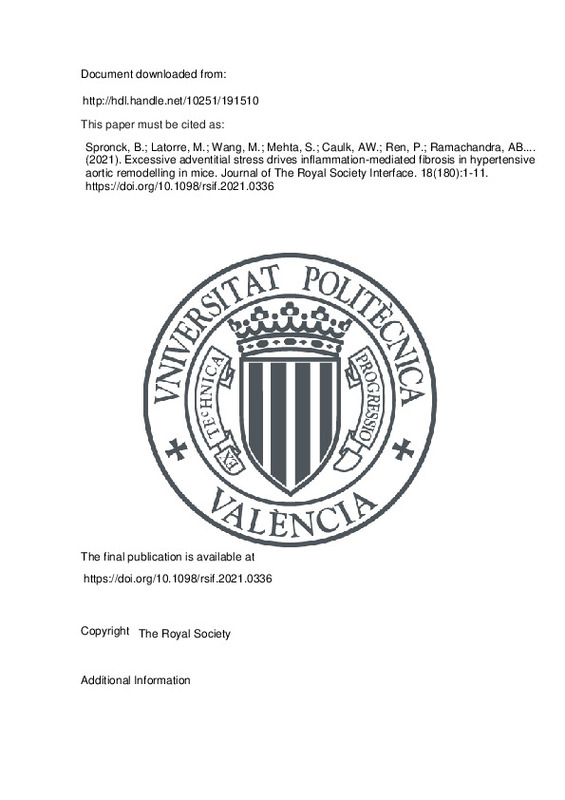Spronck, B.; Latorre, M.; Wang, M.; Mehta, S.; Caulk, AW.; Ren, P.; Ramachandra, AB.... (2021). Excessive adventitial stress drives inflammation-mediated fibrosis in hypertensive aortic remodelling in mice. Journal of The Royal Society Interface. 18(180):1-11. https://doi.org/10.1098/rsif.2021.0336
Por favor, use este identificador para citar o enlazar este ítem: http://hdl.handle.net/10251/191510
|
Título:
|
Excessive adventitial stress drives inflammation-mediated fibrosis in hypertensive aortic remodelling in mice
|
|
Autor:
|
Spronck, Bart

 Latorre, Marcos
Wang, Mo
Mehta, Sameet
Caulk, Alexander W.
Ren, Pengwei
Ramachandra, Abhay B.
Murtada, Sae-Il
Rojas, Alexia
He, Chang-Shun
Jiang, Bo
Bersi, Matthew R.
Tellides, George
Humphrey, Jay D.
Latorre, Marcos
Wang, Mo
Mehta, Sameet
Caulk, Alexander W.
Ren, Pengwei
Ramachandra, Abhay B.
Murtada, Sae-Il
Rojas, Alexia
He, Chang-Shun
Jiang, Bo
Bersi, Matthew R.
Tellides, George
Humphrey, Jay D.
|
|
Fecha difusión:
|
|
|
Resumen:
|
[EN] Hypertension induces significant aortic remodelling, often adaptive but sometimes not. To identify immuno-mechanical mechanisms responsible for differential remodelling, we studied thoracic aortas from 129S6/SvEvTac ...[+]
[EN] Hypertension induces significant aortic remodelling, often adaptive but sometimes not. To identify immuno-mechanical mechanisms responsible for differential remodelling, we studied thoracic aortas from 129S6/SvEvTac and C57BL/6 J mice before and after continuous 14-day angiotensin II infusion, which elevated blood pressure similarly in both strains. Histological and biomechanical assessments of excised vessels were similar at baseline, suggesting a common homeostatic set-point for mean wall stress. Histology further revealed near mechano-adaptive remodelling of the hypertensive 129S6/SvEvTac aortas, but a grossly maladaptive remodelling of C57BL/6 J aortas. Bulk RNA sequencing suggested that increased smooth muscle contractile processes promoted mechano-adaptation of 129S6/SvEvTac aortas while immune processes prevented adaptation of C57BL/6 J aortas. Functional studies confirmed an increased vasoconstrictive capacity of the former while immunohistochemistry demonstrated marked increases in inflammatory cells in the latter. We then used multiple computational biomechanical models to test the hypothesis that excessive adventitial wall stress correlates with inflammatory cell infiltration. These models consistently predicted that increased vasoconstriction against an increased pressure coupled with modest deposition of new matrix thickens the wall appropriately, restoring wall stress towards homeostatic consistent with adaptive remodelling. By contrast, insufficient vasoconstriction permits high wall stresses and exuberant inflammation-driven matrix deposition, especially in the adventitia, reflecting compromised homeostasis and gross maladaptation.
[-]
|
|
Palabras clave:
|
Contractility
,
Fibrosis
,
Stiffness
,
Aorta
,
Smooth muscle phenotype
,
C57BL/6 J
,
Inflammation
,
129S6/SvEvTac
|
|
Derechos de uso:
|
Reconocimiento (by)
|
|
Fuente:
|
Journal of The Royal Society Interface. (issn:
1742-5689
)
|
|
DOI:
|
10.1098/rsif.2021.0336
|
|
Editorial:
|
The Royal Society
|
|
Versión del editor:
|
https://doi.org/10.1098/rsif.2021.0336
|
|
Código del Proyecto:
|
info:eu-repo/grantAgreement/EC/H2020/793805/EU
...[+]
info:eu-repo/grantAgreement/EC/H2020/793805/EU
info:eu-repo/grantAgreement/NWO//Rubicon 452172006/
info:eu-repo/grantAgreement/NIH//R01 HL105297//Mechanisms Underlying the Progression of Arterial Stiffness in Hypertension/
info:eu-repo/grantAgreement/NIH//P01 HL134605 //Endothelial Mechanotransduction in Thoracic Aneurysm Formation and Progression/
info:eu-repo/grantAgreement/NIH//U01 HL142518//Multimodality imaging-driven multifidelity modeling of aortic dissection/
info:eu-repo/grantAgreement/NIH//R01 HL146723//Smooth Muscle Cell Proliferation and Degradative Phenotype in Thoracic Aorta Aneurysm and Dissection/
[-]
|
|
Agradecimientos:
|
This work was supported by grants from NIH (grant nos. R01HL105297, P01 HL134605, U01 HL142518, R01 HL146723), Netherlands Organisation for Scientific Research (grant no. Rubicon 452172006) and the European Union¿s Horizon ...[+]
This work was supported by grants from NIH (grant nos. R01HL105297, P01 HL134605, U01 HL142518, R01 HL146723), Netherlands Organisation for Scientific Research (grant no. Rubicon 452172006) and the European Union¿s Horizon 2020 research and innovation program (grant no. 793805)
[-]
|
|
Tipo:
|
Artículo
|







![[Cerrado]](/themes/UPV/images/candado.png)


